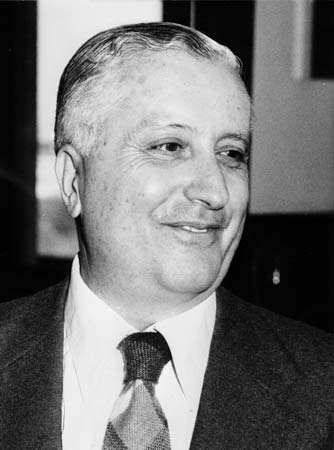Prigogine, Ilya
Russian-Belgian physical chemist
born Jan. 25, 1917, Moscow, Russia
died May 28, 2003, Brussels, Belg.
 Russian-born Belgian physical chemist who received the Nobel Prize for Chemistry in 1977 for contributions to nonequilibrium thermodynamics.
Russian-born Belgian physical chemist who received the Nobel Prize for Chemistry in 1977 for contributions to nonequilibrium thermodynamics.Prigogine was taken to Belgium as a child. He received a doctorate in 1941 at the Free University in Brussels, where he accepted the position of professor in 1947. In 1962 he became director of the International Institute of Physics and Chemistry in Solvay, Belg. He also served as director of the Center for Statistical Mechanics and Thermodynamics at the University of Texas in Austin from 1967 until his death.
Prigogine's work dealt with the application of the second law of thermodynamics (thermodynamics) to complex systems, including living organisms. The second law states that physical systems tend to slide spontaneously and irreversibly toward a state of disorder (a process driven by an increase in entropy); it does not, however, explain how complex systems could have arisen spontaneously from less-ordered states and have maintained themselves in defiance of the tendency toward maximum entropy. Prigogine argued that as long as systems receive energy and matter from an external source, nonlinear systems (or dissipative structures, as he called them) can go through periods of instability and then self-organization, resulting in more-complex systems whose characteristics cannot be predicted except as statistical probabilities. Prigogine's work was influential in a wide variety of fields, from physical chemistry to biology, and was fundamental to the new disciplines of chaos (chaos theory) theory and complexity theory.
- absolute temperature scale
- absolute value
- absolute zero
- absolution
- absolutism
- absorption
- Absorption coefficients of common materials at several frequencies
- absorption edge
- Abstbessingen faience
- abstract art
- Abstract Expressionism
- Abstraction-Création
- abstract poem
- Absurd, Theatre of the
- Abu
- Abu al-Faḍl ʿAllāmī
- Abu al-Qāsim Maḥmūd ibn ʿUmar al- Zamakhsharī
- Abu Bakar
- Abubakar, Abdusalam
- Abu Dhabi
- Abuja
- Abukuma-sammyaku
- Abulfatah Agung
- Abu Madi, Iliya
- Abundance of the naturally occurring rare-earth elements